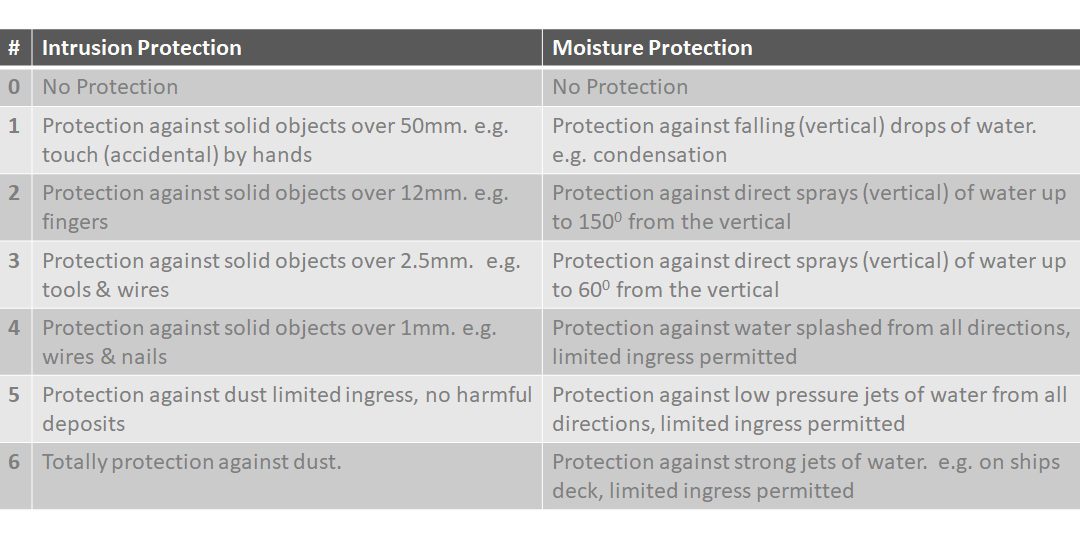A UPS IP rating of IP20 means the UPS enclosure only protects against solid objects of over 12mm and has no moisture protection.
When it comes to power protection a UPS is an important investment and so it needs to be kept in suitable conditions to optimise its design life fully. This sounds like a fairly obvious statement to make! However, it’s not always possible for a UPS to be housed in a clean room environment. We often see UPS situated in damp, dusty or less than ideal conditions as there is no other option. Where a clean room environment is just not possible, it is necessary to consider the Ingress Protection (IP) rating of the solution to maximise its longevity and ensure it can keep protecting the critical load as it was designed to do.
IP ratings are defined by an international standard. This sets the levels of sealing effectiveness for electrical enclosures against intrusion from items such as dirt and moisture. The IP rating is made up of two letters and two numbers, the key thing to focus on here are the numbers. The first number details the protection level for solid objects and the second number details the protection level for moisture.
Typically, a UPS within a data centre has an IP20 rating due to the clean environment. This level of ingress protection means it’s ‘finger proof’. In other words, safe to touch without fear of electrocution. It will also be suitable for the dust and moisture free installation areas typically found in clean environments such as comms rooms.
Higher ingress protection is needed for harsher environments such as industrial settings. These may include water treatment works, power stations, offshore, defence applications and some medical facilities.
The higher the IP rating, the more in-built protection is included within the UPS enclosure. For example: IP54 ensures the UPS is protected from limited amounts of dust and water spray from all angles. Extractor grills and fans can circulate air without it compromising the UPS.
IP65 is likely to be the highest rating for a UPS. Other electrical solutions do have higher ratings which go up to IP69K enclosures, these systems are dust tight and have been proven to be resistant against liquids including chemicals, high temperatures and high pressure. These systems are ideal for facilities with strict hygiene requirements.
However, this level of protection presents an issue for UPS solutions with integral batteries as there is not enough ventilation to enable low levels of gas which can be produced by VRLA batteries to escape safely. Although small, there is a risk of explosion and so for systems with integral batteries this is not an option.
The main point to remember is the more robust the equipment, the longer it will last in harsher environments and so up to a point, the higher the IP rating needs to be. However, circumstances are all very individual and so it is worth discussing the proposed housing area of the UPS with our technical sales team well in advance so they can advise on the best option available. Combining our fault-tolerant technology with an IP rated enclosure provides total peace of mind and assurance that your critical load is protected to the highest level possible.
CENTIEL is a Swiss-based technology company designing, manufacturing and delivering industry-leading power protection solutions for critical facilities. Its three phase true modular UPS, CumulusPower known for its “9 nines” (99.9999999%) system availability and low total cost of ownership through its Maximum Efficiency Management (MEM) and low losses of energy, has now been installed in datacentre’s and comms rooms in over 60 countries across five continents. More than 50 MW of critical power loads are now protected with CumulusPower in locations across the world including: the UK, Singapore, Australia, Germany, Spain, the Czech Republic and the Channel Islands.
By Aaron Oddy, Sales Engineer, CENTIEL UK
Article featured in UK Power News & World Independent Power Magazine July 2020

